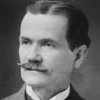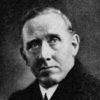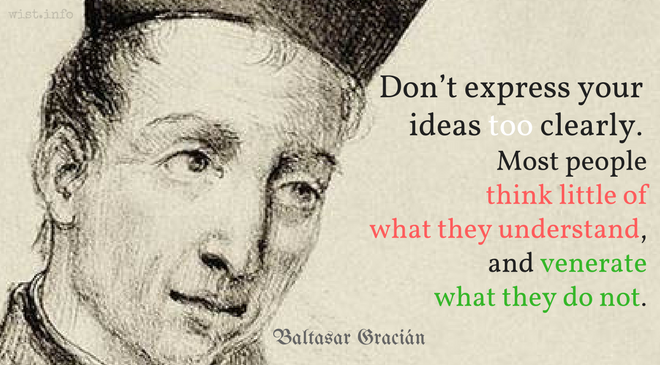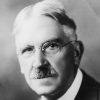There’s many a slip betwixt the observation and the conclusion.
Austin O'Malley (1858-1932) American ophthalmologist, professor of literature, aphorist
Keystones of Thought (1914)
(Source)
Quotations about:
evaluation
Note not all quotations have been tagged, so Search may find additional quotes on this topic.
The proof of gold is fire, the proof of woman, gold; the proof of man, a woman.
Benjamin Franklin (1706-1790) American statesman, scientist, philosopher, aphorist
Poor Richard (1733)
(Source)
Liberal learning is both a safeguard against false ideas of freedom and a source of true ones.
Whitney Griswold (1906–1963) American historian, educator [Alfred Whitney Griswold]
“Freedom, Security, and the University Tradition,” speech, Columbia University Bicentennial (1954-06-02)
(Source)
Reprinted in Griswold, In the University Tradition (1957).
Quoted by John F. Kennedy in a speech at Yale University (1962-06-11). Citations of Kennedy for the quote are far more common than for Griswold's original.
It is hardly in human nature that a man should quite accurately gauge the limits of his own insight; but it is the duty of those who profit by his work to consider carefully where he may have been carried beyond it. If we must needs embalm his possible errors along with his solid achievements, and use his authority as an excuse for believing what he cannot have known, we make of his goodness an occasion to sin.
William Kingdon Clifford (1845-1879) English mathematician and philosopher
“The Ethics of Belief,” Part 2 “The Weight of Authority,” Contemporary Review (Jan 1877)
(Source)
Wisdom is not gained by knowing what is right. Wisdom is gained by practicing what is right, and noticing what happens when that practice succeeds and when it fails.
Barbara Brown Taylor (b. 1951) American minister, academic, author
An Altar in the World, ch. 2 (2009)
(Source)
You are astonished to find yourself the butt of so much calumny, opposition, indifference and ill-will. You will be more so and have more of it; it is the reward of the good and the beautiful: one may calculate the value of a man from the number of his critics and the importance of a work by the evil said of it.
You can tell the man who rings true from the man who rings false, not by his deeds alone, but also by his desires.
[Δόκιμος ἀνὴρ καὶ ἀδόκιμος οὐκ ἐξ ὧν πράσσει μόνον, ἀλλὰ καὶ ἐξ ὧν βούλεται.]
Democritus (c. 460 BC - c. 370 BC) Greek philosopher
Frag. 68 (Diels) [tr. Bakewell (1907)]
(Source)
Diels citation "68. (40 N.) DEMOKRATES. 33." Bakewell lists this under "The Golden Sayings of Democritus." Freeman notes this as one of the Gnômae, from a collection called "Maxims of Democratês," but because Stobaeus quotes many of these as "Maxims of Democritus," they are generally attributed to the latter.
Alternate translations:
- "A man is approved or rejected not only by what he doth, but by what he wills." [Hammond (1845)]
- "The worthy and the unworthy man are to be known not only by their actions, but also their wishes." [tr. Freeman (1948)]
- "One of esteem and one without it do not only act for different reasons but they desire for different reasons too." [tr. @sententiq (2018), fr. 67]
- "Accomplished or unaccomplished we shall call a man not only from what he does but from what he desires, too." [Source]
- "The worthy and unworthy are known not only by their deeds, but also by their desires." [Source]
A good tree cannot bring forth evil fruit, neither can a corrupt tree bring forth good fruit. Every tree that bringeth not forth good fruit is hewn down, and cast into the fire. Wherefore by their fruits ye shall know them.
The Bible (The New Testament) (AD 1st - 2nd C) Christian sacred scripture
Matthew 7:18–20 (KJV)
Alt. trans.:
- "A healthy tree cannot bear bad fruit, and a poor tree cannot bear good fruit. And any tree that does not bear good fruit is cut down and thrown in the fire. So then, you will know the false prophets by what they do." (GNT)
- "A good tree cannot bear bad fruit, nor can a bad tree bear good fruit. Every tree that does not bear good fruit is cut down and thrown into the fire. Thus you will know them by their fruits." (NRSV)
We readily inquire, “Does he know Greek or Latin?” “Can he write poetry and prose?” But what matters most is what we put last: “Has he become better and wiser?” We ought to find out not who understands most but who understands best.
[Nous nous enquerons volontiers: “Sçait-il du Gre ou du Latin? Estriil en vers ou en prose?” Mais sìl est devenu ou plus advisé, c’estoit le principal, et c’est ce qui demeure derrier. Il falloit sènquerir qui est mieux sçavant, non qui est plus sçavant.]
Michel de Montaigne (1533-1592) French essayist
The Complete Essays, I:25 “On Schoolmasters [Du pédantisme]”
(Source)
Don’t express your ideas too clearly. Most people think little of what they understand, and venerate what they do not. […] Many praise without being able to say why. They venerate anything hidden or mysterious, and they praise it because they hear it praised.
[No allanarse sobrado en el concepto. Los más no estiman lo que entienden, lo que no perciben lo veneran. […] Alaban muchos lo que, preguntados, no saben dar razón. ¿Por qué? Todo lo recóndito veneran por misterio y lo celebran porque oyen celebrarlo.]
Baltasar Gracián y Morales (1601-1658) Spanish Jesuit priest, writer, philosopher
The Art of Worldly Wisdom [Oráculo Manual y Arte de Prudencia], § 253 (1647) [tr. Maurer (1992)]
(Source)
(Source (Spanish)). Alternate translations:
Not to be too intelligible. Most part do not esteem what they conceive, but admire what they understand not. [...] Many praise that which they can give no reason for, when it is asked them: because they reverence as a mystery all that is hard to be comprehended, and extoll it, by reason they hear it extolled.
[Flesher ed. (1685)]
Do not Explain overmuch. Most men do not esteem what they understand, and venerate what they do not see. [...] Many praise a thing without being able to tell why, if asked. The reason is that they venerate the unknown as a mystery, and praise it because they hear it praised.
[tr. Jacobs (1892)]
A Bit Vague. For most men have low regard for what they understand, and venerate only what is beyond them. [...] Many praise, but if asked can give no reason: Why? for they revere all that is hidden because mysterious, and they sing its praises, because they hear its praises being sung.
[tr. Fischer (1937)]
When my information changes, I alter my conclusions. What do you do, sir?
John Maynard Keynes (1883-1946) English economist
(Attributed)
Reply to a criticism of having changed his position on monetary policy. Quoted in Paul Samuelson, "The Keynes Centenary" The Economist, Vol. 287 (1983), but possibly apocryphal (see here).
Variants:
- "When events change, I change my mind. What do you do?"
- "When the facts change, I change my mind. What do you do, sir?"
- "When someone persuades me that I am wrong, I change my mind. What do you do?"
The main work of the historian is not to record, but to evaluate; for, if he does not evaluate, how can he know what is worth recording?
E. H. Carr (1892-1982) British historian, journalist, international relations theorist [Edward Hallett "Ted" Carr]
What is History?, ch. 1 (1961)
(Source)
Recounting the historiographical writings of Benedetto Croce in the 1920s.
But Yahweh said to Samuel, “Take no notice of his appearance or his height for I have rejected him; God does not see as man sees; man looks at appearances but Yahweh looks at the heart.”
The Bible (The Old Testament) (14th - 2nd C BC) Judeo-Christian sacred scripture [Tanakh, Hebrew Bible], incl. the Apocrypha (Deuterocanonicals)
1 Samuel 16:7 [JB (1966)]
(Source)
God rejecting Eliab (and all of David's other brothers) to be the next king. Alternate translations:
But the Lord said unto Samuel, Look not on his countenance, or on the height of his stature; because I have refused him: for the Lord seeth not as man seeth; for man looketh on the outward appearance, but the Lord looketh on the heart.
[KJV (1611)]
But the Lord said to him, “Pay no attention to how tall and handsome he is. I have rejected him, because I do not judge as people judge. They look at the outward appearance, but I look at the heart.”
[GNT (1976)]
But the Lord said to Samuel, “Do not look on his appearance or on the height of his stature, because I have rejected him, for the Lord does not see as mortals see; they look on the outward appearance, but the Lord looks on the heart.”
[NRSV (1989)]
I would give the broad sweep of the First Amendment full support. I have the same confidence in the ability of our people to reject noxious literature as I have in their capacity to sort out the true from the false in theology, economics, or any other field.
William O. Douglas (1898-1980) US Supreme Court justice (1939-75)
Roth v. United States, 354 U.S. 476, 514, dissenting opinion (1957)
(Source)
No individual or group will be judged by whether they come up to or fall short of some fixed result, but by the direction in which they are moving. The band mans is the man who no matter how good he has been is beginning to deteriorate, to grow less good. The good man in the man who no matter how morally unworthy he has been is moving to become better. Such a conception makes one severe in judging himself and humane in judging others.
John Dewey (1859-1952) American teacher and philosopher
Reconstruction in Philosophy, ch. 7 “Moral Reconstruction” (1919)
(Source)
It is the mark of an educated mind to be able to entertain a thought without accepting it.
Aristotle (384-322 BC) Greek philosopher
(Spurious)
First attributed to Aristotle in Lowell L. Bennion, Religion and the Pursuit of Truth (1959). Unfound as such.
Sometimes thought (though I feel it's a bit of a stretch) a misinterpretation of Nicomachean Ethics 1.3.4 (1094b): "For it is the mark of an educated person to search for the same kind of clarity in each topic to the extent that the nature of the matter accepts it."
More discussion of this quotation:
I have no use for the strictures of You must. You must not.
[無可無不可]
Confucius (c. 551- c. 479 BC) Chinese philosopher, sage, politician [孔夫子 (Kǒng Fūzǐ, K'ung Fu-tzu, K'ung Fu Tse), 孔子 (Kǒngzǐ, Chungni), 孔丘 (Kǒng Qiū, K'ung Ch'iu)]
The Analects [論語, 论语, Lúnyǔ], Book 18, verse 8 (18.8.5) (6th C. BC) [ed. Lao-Tse, tr. Hinton (1998)]
(Source)
(Source (Chinese)). Alternate translations:
I have no course for which I am predetermined, and no course against which I am predetermined.
[tr. Legge (1861)]
I will take no liberties, I will have no curtailing of my liberty.
[tr. Jennings (1895); in the footnote he gives a more raw translation, "Without possibilities (or freedom to act) -- without impossibilities"]
With me there is no inflexible "thou shalt" or 'thou shalt not."
[tr. Soothill (1910)]
I have no categoric can and cannot.
[tr. Pound (1933)]
I have no "thou shalt" or "thou shalt not."
[tr. Waley (1938)]
I accept life as it comes. [tr. Ware (1950)]I have no preconceptions about the permissible and the impermissible.
[tr. Lau (1979)]
I avoid saying what should or should not be done.
[tr. Dawson (1993)]
I follow no rigid prescriptions on what should, or should not, be done.
[tr. Leys (1997)]
I have neither favorable nor unfavorable situation. [tr. Huang (1997)]I have not any stubborn positiveness or negation.
[tr. Cai/Yu (1998)]
I do not have presuppositions as to what may and may not be done.
[tr. Ames/Rosemont (1998)]
I have no "may" and no "may not."
[tr. Brooks/Brooks (1998)]
I have no preconceptions about what one can or cannot do.
[tr. Annping Chin (2014)]
This may be the source of Lin-Yutang, ed. The Wisdom of Confucius (1938):
The superior man goes through his life without any one preconceived course of action or any taboo. He merely decides for the moment what is the right thing to do.



















